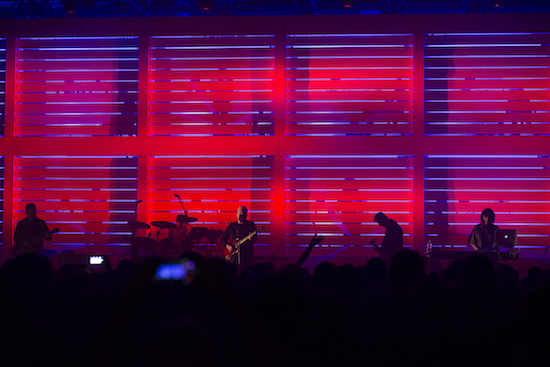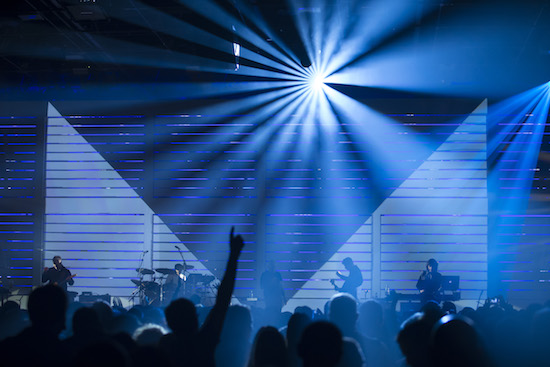Spinningfields, Manchester, 2017: the evening sun sets on old quays, old ghosts, and new developments. Around the corner from a towering skyscraper called Bauhaus and restaurants selling seared tuna and zero-calorie noodles, we’re in another monument to Tony Wilson’s metropolitan legacy. Stage 1 at the Old Granada Studios is lit atmospherically tonight, the ceiling an industrial patchwork of cables and wires. A Factory-like formula is projected onto a screen behind the stage: Σ=No, 12k, Lg, 17Mif. The sum (of tonight’s proceedings) = New Order, 12 synthesisers, visual artist Liam Gillick, the year, the international festival that began ten years ago in July 2007, a month after Wilson’s death. Σ is also E on some of the festival literature, suggesting the legacy of ecstasy on the band’s rock sound, and their legacy as a touchstone band of electronica. It is this legacy that is being underlined tonight – New Order as the men and women of machines in the city of machines.
Bernard Sumner and Stephen Morris first played on this stage in September 1978, not on Wilson’s programme, So It Goes, although the subtitle of tonight’s performance suggests this (that show was cancelled following an expletive-filled appearance by Iggy Pop; instead, Joy Division played ‘Shadowplay’ at teatime – take a moment to imagine that – on Wilson’s news programme Granada Reports). Tonight, alongside longtime bandmate Gillian Gilbert, who returned and made the band great again in 2011, and newer colleagues Phil Cunningham and Tom Chapman, they play with twelve synthesiser players from the Royal Northern College of Music, who Sumner describes in the encore, as wryly as he can despite his obvious awe, as “19, 18, 16, something like that”. They play not just as a band, but as part of something bigger: the great history of what movement and progress have meant to this city – giving it a pulse, a rhythm. Machines were once sweated over and laboured in Manchester, now they run themselves. Once, they made objects around here, now they make art.
Their greatest legacy – of being a band who are at their greatest behind the synthesiser and the sampler – is something that New Order have become more comfortable with over the years, after their diversions into Britpop-aping indie at the turn of the century. (We mustn’t forget that New Order have always been prime pilferers of the music around them, though – ‘Blue Monday’ being a distillation of the bassline from Sylvester’s ‘You Make Me Feel (Mighty Real)’, the beat in Klein & MBO’s ‘Dirty Talk’, the robot choir from Kraftwerk’s ‘Uranium’, and Donna Summer’s ‘Our Love’, according to interviews over the decades with Sumner, Gilbert and former member Peter Hook.) New Order’s Britpop period also coincided with the absence of Gilbert, who in recent years has finally been recognised as the real magic ingredient in the New Order mix. She sequenced and programmed ‘Blue Monday’. She wrote the ridiculously catchy melody for the BBC2 youth programme Reportage, which became the melody for their only number 1, 1990’s ‘World In Motion’. 2015’s Music Complete was an incredible return to form, a brilliant, bubbling confection of synthesised sound. This cannot have been a coincidence.
Three other women stand behind Gilbert onstage tonight, alongside nine men – a slightly better gender ratio among the younger generation, rather nicely, to that of her band. The set is part Peter Saville, part Pet Shop Boys high-concept performance, with the synthesiser players in two rows of six boxes to the back of the stage, behind pivoting blinds. Sometimes they’re seen, sometimes not; the person who arranged their parts, composer Joe Duddell, conducts at the left of the stage. This is more of a conceptual gesture than a necessity, as half the time none of the players can see him; it’s more of a statement about the band’s status, and the closer connections these days between classical music and pop in the mainstream (Duddell also arranged Elbow’s work for the Halle Orchestra performances in 2011, and is composer in residence at Festival No 6). It’s also about the elevation of pop music, about its importance, its vitality, its validity in life.
The band try and wrestle with their more straightforward guitar moments early on, and these are the less successful segments of the show. Take ‘Who’s Joe’ from 2005’s Get Ready coming two songs in – it wasn’t their most thrilling moment then, and it isn’t now. ‘Dream Attack’ follows, the final and only guitar-led song on Technique, by which point every member of the band is wielding an axe and slamming its strings. The night feels like it is taken a wrong turn, or the shimmer of a missed opportunity. Then ‘Disorder’ drops, and everything makes sense.
Played on this tour by New Order for the first time, the guitar becomes something other a guitar – it still drives, but also shudders, becoming an agent of new, mechanical sound rather than a macho adjunct to a body, the surrounding electronics given it a more pneumatic power. You’re reminded that Martin Hannett first foisted electronic textures on the band, and that their first adventures in this world were often awkward and amateurish – but full of incredible beauty, conceptual power and possibility that translated to their audience in a real sense of euphoria (evidence for the prosecution: this writer’s favourite album, Power, Corruption & Lies). Watching the band tonight, you still sense that they frequently want to return to their base(/bass) materials, that the need to connect with their original instruments pulls, as they try to remember who they were at the beginning – which is obviously more of a presence tonight due to this location and history. But they allow themselves to be a band for whom electronica, and the new beginnings it offered, was their salvation, and it gradually becomes more comfortable to them.
Electronic tracks from throughout their career underline this tonight. 1983’s ‘Ultraviolence’ bites hard on the tail of ‘Disorder’, its melody basic and slow-moving, always threatening to disintegrate but always hanging on, a sense which only adds to its drama (as do its lyrical extremes, the touch of cold hands “burning my soul”). Then comes ‘In A Lonely Place’, the late Joy Division track that became the b-side to New Order’s ‘Ceremony’, played live for the first time since 1998. The way the synthesisers soar at its start, alongside live guitars that don’t entirely sound like guitars, remind us how much Joy Division’s music pushed their brief beyond rock, post-rock (as Jeanette Leech writes in Fearless, her fascinating new study of that later genre, the way they created new worlds beyond the conventional rock format is impossible to deny).

Then come their peerless examples of pop, their melodies bangingly bright. ‘Plastic’ from their Music Complete shudders joy around these walls, a timeless classic from their catalogue while feels utterly contemporary and not remotely nostalgic. ‘Sub-Culture’ sounds similarly glorious, the synthesiser orchestra amplifying its reach, Commander Gilbert filter-sweeping the melody through the room, our minds, our muscles, our memories. Hearing ‘Bizarre Love Triangle’ in this setting is an incredibly moving experience; the track gets an even more energetic workout than its ’94 remix, bolstered by additional parts and extra layers of sound. The audience don’t move enough – perhaps on account of its median age – but the synthesiser players are particularly animated in this section, especially one man in the centre of the top row, his legs jiggling like a marionette. ‘Shellshock’ also surges like a statement of intent, about life, about love, about music. “It’s never enough/ It’s never enough/until your heart stops beating,” sings the 61-year-old in the centre of the stage, who you sense, at that moment, might never stop dancing. We’re reminded of where we’re going, but in a spirit of energy and utter euphoria.
The encore also reminds us where we are, and where we’ve been. ‘Your Silent Face’ sounds as alive and as innocent and as searching as it always has, its lyrics falling over themselves, its ‘Europe Endless’ synth figure bubbling and tumbling. It’s a song that means little lyrically, but means everything sonically to New Order’s legacy – it’s the sound of a band putting together a heap of broken images, letting new directions guide them, allowing electronics to show them new ways. Joy Division’s ‘Decades’ follows it, and plays, in the best of ways, like a punch to the gut. Electronics successfully conjure up that arctic, terrifying hinterland between life and death, landscapes of fear, of longing, of things we have lost. Nobody moves. It’s a stunning finale.
The most beautiful thing about tonight, though, is that Joy Division found themselves here, so many years ago, both literally and metaphorically. So many of their oldest fans first found them here too, via a box lit up in the corner of their living rooms, a box containing four young men playing in its shadows. A beam of electrons from a cathode is where all of this began. A legacy in sound, and in life, began there that would truly come alive through electronica. This is the sound in the centre of this city in this night, still waiting for us.


